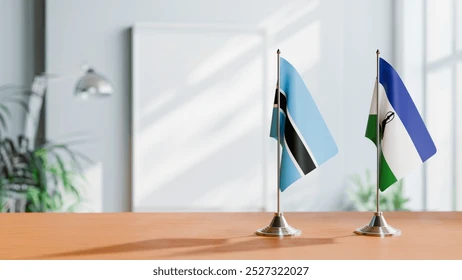How did Botswana leave Lesotho behind?
Nkopane Mathibeli
“Those who have no record of what their forebears have accomplished lose the inspiration that comes from the teaching of biography and history” – Carter G. Woodson (1875 – 1950)
According to the version of our history written by D.F. Ellenberger, the group of migrants (Bakoena) from whom emerged the founder of our nation came from Botswana, led by Napo, the second son of Masilo II. Napo left as an expression of his refusal to be overshadowed by his older brother (Mochudi), who inherited the throne of the Bakoena tribe, which was just one of the 12 tribes in Botswana. Might Napo’s obviously ego-driven rebellion against legitimate authority be the basis of what became the mainstay of his descendants’ political DNA – a selfish obsession with power? That aside, this narrative regarding our origin somehow makes Batswana our older siblings. As if to emphasise that seniority, the Brits granted them independence on September 30, 1966, after which Lesotho followed only three days later.
Given the current contrast between these two nations, how did the Batswana leverage their three-day head start to leap ahead by what today seems like three decades? I contend that they did so because to them, nationhood is the centre on which everything turns, courtesy of the political wisdom of their founding father (Seretse Khama) who inspired by the accomplishments of his forebears (specifically Khama III), ensured that not only the founding principles general to all tribes are central to the new state machinery but also that the virtue of national leadership is measured by its subservience to the electorate. This virtue is only demonstrable by utilising the state machinery for the sole benefit of the electorate. This led to Batswana’s loyalty to national/political leadership being subservient, and so did the political and national psyche of Batswana come into being. But how different are Botswana and Lesotho today?
Differences and their causes
Currently, Botswana has its GDP at P49,4 billion and its GDP/capita at $6,937/P95,883. According to the Bank of Botswana’s statement of financial position as at 31st May 2025, its international Net Reserves are at $ 3,508,771. This translates to P48.4 billion, which is equivalent to nine months of import cover. On the other hand, Lesotho currently has its GDP at a little over $2 billion, and its GDP/capita is at $1,100/M19,106. According to the Central Bank of Lesotho’s Monetary policy statement of 25th March 2025, our Net International Reserves are at $998,9 million, which translates to M 17,3 billion, i.e. 4.7 months of import cover. Is it rationally possible to attribute Lesotho’s economic backwardness to its small size and being completely inside South Africa? Absolutely not. For instance, a country named San Marino, completely inside Italy, is 495 times smaller than Lesotho but richer than Italy on a per capita basis.
It may, of course, be easier to contest this comparison of San Marino with Italy on the basis of the former having a total population of a little less than 34,000 compared to Italy’s 58 million. But in the same vein, Lesotho’s population is 27 times smaller than that of South Africa, yet its GDP/capita is even smaller than that of South Africa’s poorest province (Eastern Cape). Isn’t this enough proof that the root of our country’s economic backwardness is not so much its population size, land mass, an enclave status or even a little mineral endowment? Have we ever considered whether our collective (political elites & electorate’s) political wisdom and virtue are par to the task at hand? Here is a classic example that is likely to convince holders of a different viewpoint. The DRC is way bigger than Botswana in land mass, has a larger population and is much more endowed with minerals, yet its GDP/capital is even smaller than that of Lesotho, let alone Botswana’s.
Nation-building and state formation
Basotho under Morena Moshoeshoe I became a nation many decades before the idea of nationhood took root among the tribes inhabiting the territory of Botswana. As advised by his mentor (Morena Mohlomi), the central principles around which our nation was formed were: take care of the weak and vulnerable (social development policies); share your wealth with your subjects (wealth redistribution policies); enjoy the profits of hard work not the fruits of war (virtuous living/moral uprightness); marry many wives (broaden diplomatic footprint). This worked well, and Basotho became a formidable nation that successfully defended its territory and sovereignty against Afrikaner encroachment. On the contrary, the lifaqane, which essentially became a catalyst of nation-building among Basotho, led to the opposite among Batswana. Between 1823 and 1842, they were torn apart by the Bakololo of Sebetwane and later by the Amandebele of Mzilikazi. Both invasions wreaked havoc, further deferring the idea of nationhood.
Although like Basotho, Batswana successfully defended their territory from Afrikaner encroachment, their military offensive was not a national affair but an offensive of only four tribes led by Kgosi Sechele I of Bakoena. The first seed of Tswana nationhood was planted by a Wesleyan missionary (Josef Ludorf) when he encouraged the chiefs of three tribes (Batlhaping, Barolong and Bangwaketse) to form a nation in 1871. He even drafted a constitution for them, but the project failed due to the narrowness of his envisioned nationhood. Even when the Brits took over Botswana as a protectorate in 1885, its inhabitants were still not a nation in the strict, technical sense of being a people inhabiting a specific area overseen by a central government. It is on this background that Seretse Khama is rightly regarded as Botswana’s founding father.
Seretse Khama, power politics and nation-building
On March 1, 1965, Botswana held its first general elections, and Khama’s party won 28 out of the 31 contested seats. Interestingly, BDP’s victory was not based solely on its election promises. His popularity soared to great heights following his decision to forfeit his right as the heir of the Bangwato chieftainship, as triggered by the then Regent’s opposition to his taking over the chieftaincy for two reasons. The regent had already chosen a wife for Khama; Khama had already married a white woman while studying in London. On the other hand, he appealed to the masses not because the masses were excited by his white wife. He impressed himself upon them as a selfless man for forfeiting such a prestigious position, especially of the largest and wealthiest tribe of them all (Bangwato).
On acquiring political power, Khama embarked on nation-building, successfully giving it an impeccable standard of virtuous national life below which it has proudly refused to go. Since the economic trajectory on which he took Botswana is well documented, I want to sum up by briefly highlighting how Batswana’s enviable ethical orientation and discipline were instilled by Khama’s model of boldly taking patriotic decisions without fear of loss of power. I do this by bringing forth a model he emulated, as inspired by arguably the greatest chief among the numerous tribes of precolonial Botswana. Interestingly, that chief was his great-grandfather (Khama III), who became the Chief of Bangwato in 1872 but was, however, rebelled against, deposed and replaced by his father (Sekgoma I) only a year into his tenure. The reason was the radical nature of his programme to modernise Bangwato, after which he ran away only to come back and topple his father in 1875. From then, he ruled until 1923.
On his return, he implemented the same radical programme that got him deposed, and it, in turn, led to the growth of the tribe from merely being the biggest in population. Its capital (Shoshong) became Botswana’s biggest commercial hub, making Bangwato the wealthiest of all tribes. He stopped the brewing and selling of alcohol; he prohibited selling goods on credit, hunting, tree cutting, rainmaking, lebollo, polygamy and conducted espionage on adulterers. All this constituted a very hard pill to swallow for the Bangwato, but he persisted. Under Khama III’s grandson, Botswana’s progress is similarly based on selfless leadership, bold decisions and ethical conduct.
Have Basotho failed because they do not have a historical reference point? Not quite. Their fault is their despicable disregard of the wisdom of their founding father, such that today some are contemplating exchanging, for a bowl of soup, the sovereignty he gave us. Unlike Khama, they are not inspired by the biography and history of their great forebear. Instead, like Napo, many have a selfish obsession with power hence; instead of politicians of substance, many are mere dream merchants. Unlike in Botswana, where loyalty to national/political leadership is determined by its exclusive use of the state for the sole benefit of the electorate, our national political psyche is such that loyalty is determined by who sells better dreams and dishes out better crumbs. Now, that is the primary reason why Botswana left Lesotho behind and may continue to widen the gap.
Summary
- Napo left as an expression of his refusal to be overshadowed by his older brother (Mochudi), who inherited the throne of the Bakoena tribe, which was just one of the 12 tribes in Botswana.
- I contend that they did so because to them, nationhood is the centre on which everything turns, courtesy of the political wisdom of their founding father (Seretse Khama) who inspired by the accomplishments of his forebears (specifically Khama III), ensured that not only the founding principles general to all tribes are central to the new state machinery but also that the virtue of national leadership is measured by its subservience to the electorate.
- It may, of course, be easier to contest this comparison of San Marino with Italy on the basis of the former having a total population of a little less than 34,000 compared to Italy’s 58 million.

Your Trusted Source for News and Insights in Lesotho!
At Newsday Media, we are passionate about delivering accurate, timely, and engaging news and multimedia content to our diverse audience. Founded with the vision of revolutionizing the media landscape in Lesotho, we have grown into a leading hybrid media company that blends traditional journalism with innovative digital platforms.







